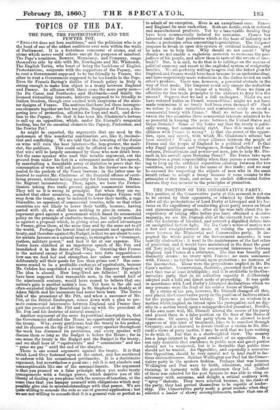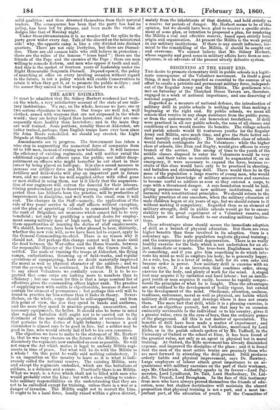THE POSITION OF THE CONSERVATIVE PARTY THE position of the
Conservative party at this moment is not one to be envied by their opponents, or admired by their friends. After all the protestations of Lord Derby at Liverpool and his lec- tures on the expediency of conducting great party issues on broad and statesmanlike grounds ; after all his wise talk about the in- expediency of taking office before you have obtained a decisive majority, we see Mr. Disraeli able at the eleventh hour to over- ride the decisions of his chief, and convert a dignified debate into an undignified faction fight. Mr. Du Cane's notice of motion was a fair and straightforward mode of raising the questions at issue between the Ministerial and Conservative party. It im- pugned the whole policy of the Government measure ; it was heartily obstructive; it went to the maintenance of the last relics of protection and it would have maintained in the front the good old Tory policy of keeping the commercial intercourse between England and France at a minimum. The line was broadly and distinctly drawn : no treaty with France ; no more commerce with France; no further inroad upon pretection ; no increase of the Income-tax. These were the propositions implied in Mr. Du Cane's motion. Conservatism, therefore, presented itself in an as- pect that was at least intelligible ; and it is creditable to theCon- servative party that in its collective capacity it deliberately adopted such a bold and direct mode of proceeding. It was quite in accordance with Lord Derby's Liverpool declarations which we may presume were -the fruit of his calmer hours of thought. IV a stroke of his pen, however, Mr. Disraeli changed all _this, and placed the Conservative party in the position of factious attack for the purpose of factious victory. There was no wisdom in a motion whieh implied an inroad upon the prerogative, and no nity in a motion based upon a misapprehended precedent. Besides, of his own mere will, Mr. Disraeli altered the course of his part; and placed them in a false position on the floor of the House of Commons. Of course, if the party whom he is allowed to lead approves of this kind of treatment, likes to be marched through Coventry, and is charmed to devote itself as a victim to Mr. Dis- raeli's views of party tactics, it may be said that we have nothing to do with it. But that is a short-sighted view. The country has a large interest in the good conduct of an opposition. It is not only desirable that confidence in public men and great parties should not be weakened, but it is desirable that public time should not be wasted. An Opposition and especially a conserva- tive Opposition, should be very careful not to lend itself to fac- tions obstructiveness. Neither Wellington nor Peel led the Conser- vative party in the modern fashion. Perhaps that was because Wellington and Peel were by birth, education, and political training, in harmony with the gentlemen they led. Neither of them was selected for the post because he was able to sting an adversary with sarcasms, and delight a critical auditory with " spicy ' rhetoric. They were selected because, in the ranks of the party, they had proved themselves to be capable of leader- ship. The Conservative party made a great mistake when they selected a leader of showy accomplishments, rather than one of
solid qualities ; and thus divorced themselves from their natural leaders. The consequence has been that the party has had no policy, has been led by phrases, and been made the victim of dodges like that of Monday night. Under these circumstances it is no wonder that the splits in the party grow wider every day. Talk of the discord on the ministerial side ! why, the opposite camp is like a city divided into distinct quarters. There are not only Derbyites, but there are Disrael- ites. There are old cannon balls who still believe in protection ; there are the relics of the famous "brass band" ; there are the friends of the Pope and the enemies of the Pope ; there are men willing to concede Reform, and men who oppose it tooth and nail. And this is the upshot of fourteen years of leadership under the Right Honourable Benjamin Disraeli. Depend upon it, the policy of snatching at office on every inviting occasion without regard to the future, is not a policy which will enable Conservatives to retain it when they get it, or to promote the public welfare ; and the sooner they amend in that respect the better for us all.



























 Previous page
Previous page